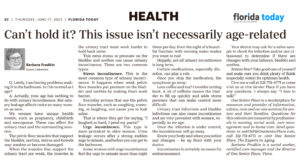
 Barbara Fradkin – Special to FLORIDA TODAY
Barbara Fradkin – Special to FLORIDA TODAY
Reader Question: Lately, I am having problems making it to the bathroom. Is this normal as I age?
 Answer: Actually, your age has nothing to do with urinary incontinence. But urinary leakage affects twice as many women as men! We women have unique health events, such as pregnancy, childbirth and menopause. These can affect the urinary tract and the surrounding muscles. The pelvic floor muscles that support the bladder, urethra, uterus and bowels may weaken or become damaged. When the muscles that support the urinary tract are weak, the muscles in the urinary tract must work harder to hold back urine. This extra stress or pressure on the bladder and urethra can cause urinary incontinence. There are two common types.
Answer: Actually, your age has nothing to do with urinary incontinence. But urinary leakage affects twice as many women as men! We women have unique health events, such as pregnancy, childbirth and menopause. These can affect the urinary tract and the surrounding muscles. The pelvic floor muscles that support the bladder, urethra, uterus and bowels may weaken or become damaged. When the muscles that support the urinary tract are weak, the muscles in the urinary tract must work harder to hold back urine. This extra stress or pressure on the bladder and urethra can cause urinary incontinence. There are two common types.
Stress incontinence– This is the most common type of urinary incontinence. It happens when weak pelvic floor muscles put pressure on the bladder and urethra by making them work harder. Everyday actions that use the pelvic floor muscles, such as coughing, sneezing, or laughing, can cause you to leak urine. That is where they get the saying, “I laughed so hard, I peed my pants!”
Urge incontinence– This type is more prevalent in older women. Urine leakage occurs after a strong sudden urge to urinate –and before you can get to the bathroom. Some women with urge incontinence feel the urge to urinate more than eight times per day. Even the sight of a beautiful fountain with running water makes you want to run!
Happily, not all urinary incontinence is long term. Certain medications, especially diuretics, can play a role. Once you stop the medication, the symptoms go away. Love coffee and tea? Consider cutting back. A lot of caffeine causes the bladder to fill up quickly and adds stress pressure that can make control more difficult. Urinary tract infections and bladder infections can also cause incontinence and are very prevalent with women, especially as we age. Once the infection is under control, the incontinence will go away.
Know your body and when you notice any changes –be up front with your doctor! Incontinence is certainly no cause for embarrassment. Your doctor may ask for a urine sample to check for infection and/or use ultrasound to determine if there are changes with your kidneys, bladder and urethra.
Bottom line? Take good care of yourself and make sure you drink plenty of fluids (especially water) for optimum health. Give me a call at 321-751-6771 or come visit us at One Senior Place if you have any questions. You know what I always say –”I love to talk!”
##
One Senior Place is a marketplace for resources and provider of information, advice, care and on-site services for seniors and their families. Questions for this column are answered by professionals in nursing, social work, care management and in-home care. To submit a question, send an email to askOSP@OneSeniorPlace.com or visit One Senior Place, The Experts in Aging at OneSeniorPlace.com.
Barbara Fradkin is a Social Worker, Certified Care Manager and the Director for One Senior Place, Viera.


